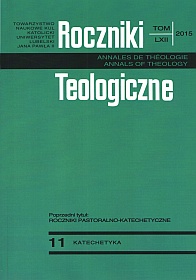Movements and Ecclesial Group Supporting Family
Abstract
In times of crisis the traditional model of the family, family associations are vitally needed and deserve special care of the Church. Families themselves are the domestic church, but they also need broader groups that would serve families by multiple support. Family movements are formed on the initiative of the same families or representatives of the hierarchy, but in the perspective of faith, they always reveal the presence and action of the Holy Spirit. They use a language that expresses more family involvement. In the family movements and groups it is easier to mature in the faith, because an aid is given by the whole community. Families can share their own experiences, provide witness to the faith and are able to overcome individualism. Mutual exchange leads to a deeper entering into problems of faith and the mystery of the sacrament of marriage. Various forms of family activities constitute support for families experiencing crises of faith. They help in solving family problems, deepen marital unity, and for the deeply religious, they give the possibility of apostolic commitment.
Catholic family associations can be a sign of change. They can be a real challenge facing the Church and society and can be a source of renewal of the whole of Christianity. They enliven the parishes and Christian families, deepen religious awareness, create a Christian environment and thereby affect social life.
References
Bertone T.: Movimento di spiritualità e di apostolato familiare. W: Movimenti ecclesiali contemporanei. Red. A. Favale. Roma 1991 s. 129-154.
Blachnicki F.: Charyzmat i wierność. Carlsberg 1985.
Congar Y.: Grupy nieformalne w Kościele z katolickiego punktu widzenia. „Collectanea Theologica” 42:1972 f. 5 s. 15-38.
Emeis D.: Die Gruppe in der Kirche. Ein Weg zur Überwindung von Identitätskriesen im Glauben. W: Gemeindepraxis. Meinz−München 1979 s. 260-267.
Kamiński R.: Biblia w życiu parafii i małych wspólnot religijnych. W: Biblia w nauczaniu chrześcijańskim. Lublin 1991 s. 139-192.
Kamiński R.: Zrzeszenia religijne a parafia. W: W prostocie prawdy, w pokorze miłości. Studia i materiały dedykowane ks. prof. dr. hab. Janowi Walowi. Red. T. Borutka, A. Baczyński, M. Ostrowski. Kraków: PAT 2008 s. 281-287.
Nowicki W.: Katolickie wspólnoty i ruchy religijne w Polsce współczesnej. „Ateneum Kapłańskie” 121:1993 nr 506 s. 89-120.
Śmigiel W.: Relacja urzędu do charyzmatu w teorii i praktyce pastoralnej. W: W prostocie prawdy, w pokorze miłości. Studia i materiały dedykowane ks. prof. dr. hab. Janowi Walowi. Red. T. Borutka, A. Baczyński, M. Ostrowski. Kraków: PAT 2008 s. 471-482.
Śmigiel W.: Ruchy, stowarzyszenia, wspólnoty i grupy wspierające rodzinę jako Kościół domowy. W: Rodzina jako Kościół domowy. Red. A. Tomkiewicz, W. Wieczorek. Lublin: KUL 2010 s. 453-464.
Wrońska H.: Ruchy religijne i katecheza. W: Wokół katechezy posoborowej. Red. R. Chałupniak i in. Opole 2004 s. 372-375.
Wrońska H.: Katecheza a małe grupy szkolne i parafialne. Lublin: KUL 2007.
Wrońska H.: Katecheza w stowarzyszeniach, ruchach i grupach. W: Miejsca katechezy: rodzina – parafia − szkoła. Red. S. Kulpaczyński. Lublin 2005 s. 99-138.
Wrońska H.: Ruchy i grupy rodzinne. W: Katecheza dziś. Red. J. Zimny. Sandomierz 2002 s. 224-250.
Copyright (c) 2015 Roczniki Teologiczne

This work is licensed under a Creative Commons Attribution-NonCommercial-NoDerivatives 4.0 International License.





